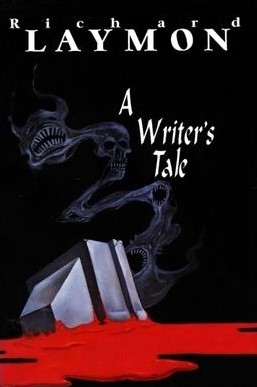 By RICHARD LAYMON (Deadline Press; 1998)
By RICHARD LAYMON (Deadline Press; 1998)
It’s a shame this book is currently so difficult to get a hold of, as it’s truly one of the finest-ever books about writing and publishing. The author was the late Richard Laymon, who with A WRITER’S TALE provides a combination autobiography and how-to guide for aspiring novelists, drafted in the same inviting, reader-friendly style of his 30-plus novels.
The book’s freeform construction incorporates a straightforward chronology of Laymon’s publishing career, a scattering of poems and stories the author wrote in his youth, miscellaneous writing tips and autobiographical reminisces, a dozen or so listings of Laymon’s favorite movies, books and authors, and short essays on the writing and reception of every one of his books (as of 1998, that is). It’s in the latter section that we learn, among other things, of how Laymon’s second novel THE WOODS ARE DARK was published in a bastardized version that Laymon claims destroyed his career in the U.S.—although he did, unlikely enough, become a bestselling author in the UK.
From an autobiographical standpoint Laymon does an excellent job laying out the facts of his life and illuminating his convivial yet sharp-edged personality. It seems curious, however, that Laymon never really goes into why it is he was drawn to write the type of fiction he did. His books remain among the most graphic and disturbing horror novels of their time, which he acknowledges was the reason for much of the failure and rejection he endured throughout his career. Yet Laymon clung steadfastly to his unforgiving brand of horror despite the fact that he never comes off as anything other than an ordinary nice guy. I can’t help but wonder what might have been roiling underneath the surface of that calm exterior.
Much of the writing advice Laymon gives is solid, if extremely opinionated and self-centered. This is to say that Laymon’s admonitions about not writing outlines or soliciting advice from other writers are fine, provided one takes into account that those things apply solely to Richard Laymon. The book is also quite dated in many aspects, notably on the subject of the internet, which clearly had yet to fully register on Laymon’s radar (judging by his tutorials on mailing out manuscripts and sending fan mail to publishers).
Those things aside, however, A WRITER’S TALE is pretty much indispensable for both Laymon fans and anyone interested in an insider’s view of how the writing trade really works. It is first and foremost a truly unique book, as Laymon acknowledges in his introduction: “A book like A WRITER’S TALE would jeopardize the career of most authors. Which is probably why you’ve never seen another book like it.” About the second part I couldn’t agree more.
